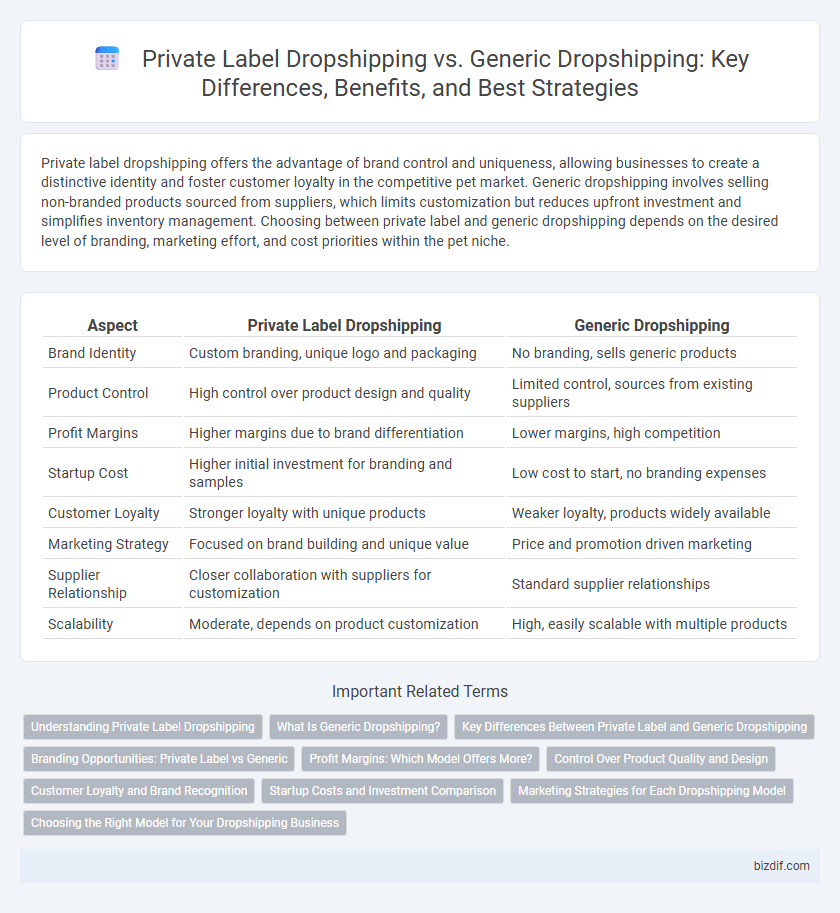Private label dropshipping offers the advantage of brand control and uniqueness, allowing businesses to create a distinctive identity and foster customer loyalty in the competitive pet market. Generic dropshipping involves selling non-branded products sourced from suppliers, which limits customization but reduces upfront investment and simplifies inventory management. Choosing between private label and generic dropshipping depends on the desired level of branding, marketing effort, and cost priorities within the pet niche.
Table of Comparison
| Aspect | Private Label Dropshipping | Generic Dropshipping |
|---|---|---|
| Brand Identity | Custom branding, unique logo and packaging | No branding, sells generic products |
| Product Control | High control over product design and quality | Limited control, sources from existing suppliers |
| Profit Margins | Higher margins due to brand differentiation | Lower margins, high competition |
| Startup Cost | Higher initial investment for branding and samples | Low cost to start, no branding expenses |
| Customer Loyalty | Stronger loyalty with unique products | Weaker loyalty, products widely available |
| Marketing Strategy | Focused on brand building and unique value | Price and promotion driven marketing |
| Supplier Relationship | Closer collaboration with suppliers for customization | Standard supplier relationships |
| Scalability | Moderate, depends on product customization | High, easily scalable with multiple products |
Understanding Private Label Dropshipping
Private Label Dropshipping involves selling products under your own brand name while a supplier manufactures and ships the items directly to customers, offering greater control over branding and customer experience. This model enables merchants to differentiate their offerings with unique packaging, logos, and marketing strategies, which can lead to higher profit margins and stronger brand loyalty compared to Generic Dropshipping. Understanding Private Label Dropshipping is essential for entrepreneurs seeking long-term growth and a competitive edge in the e-commerce market.
What Is Generic Dropshipping?
Generic dropshipping involves selling products without any brand customization, allowing retailers to offer a wide range of items sourced directly from suppliers. This method minimizes upfront investment and inventory management, as sellers list and promote products available through third-party warehouses. Retailers rely on supplier stock and shipping capabilities while focusing on marketing and customer service to drive sales.
Key Differences Between Private Label and Generic Dropshipping
Private label dropshipping involves selling products under a customized brand, allowing for unique packaging, branding, and higher profit margins compared to generic dropshipping, where sellers offer unbranded products from suppliers. Private label offers greater control over product quality and brand identity, enhancing customer loyalty, while generic dropshipping relies on volume and competitive pricing with limited differentiation. Inventory management and supplier relationships are more critical in private label dropshipping to maintain consistent brand standards.
Branding Opportunities: Private Label vs Generic
Private label dropshipping offers significant branding opportunities by allowing sellers to customize products with their own logos and packaging, creating a unique brand identity that fosters customer loyalty and recognition. In contrast, generic dropshipping involves selling non-branded products from suppliers, limiting the ability to differentiate and establish a consistent brand presence. Investing in private label strategies enhances long-term growth potential through stronger brand equity and personalized marketing efforts.
Profit Margins: Which Model Offers More?
Private label dropshipping typically offers higher profit margins due to brand exclusivity and the ability to set premium pricing based on unique product designs. Generic dropshipping relies on common products with little differentiation, resulting in more intense price competition and thinner margins. By investing in private label branding, sellers can create customer loyalty and command better profitability compared to the volume-driven, lower-margin generic dropshipping model.
Control Over Product Quality and Design
Private label dropshipping offers greater control over product quality and design by allowing sellers to customize packaging, branding, and product specifications, resulting in a unique customer experience. Generic dropshipping relies on pre-made products from suppliers with limited influence over quality standards or aesthetic elements, which can lead to inconsistent branding and customer perception. Choosing private label dropshipping enhances brand reputation and customer loyalty through tailored quality and design, while generic dropshipping prioritizes ease and speed of market entry.
Customer Loyalty and Brand Recognition
Private label dropshipping significantly enhances customer loyalty by allowing businesses to create a unique brand identity, fostering trust and repeat purchases. Unlike generic dropshipping, private labeling enables consistent packaging and tailored marketing, which strengthens brand recognition and differentiation in competitive markets. Customers are more likely to engage with and recommend private label products due to the perceived quality and exclusivity associated with a distinct brand.
Startup Costs and Investment Comparison
Private label dropshipping requires higher startup costs due to product customization, branding, and packaging expenses, often ranging from $2,000 to $5,000 to develop unique items and establish brand identity. Generic dropshipping minimizes initial investment as sellers rely on existing products without customization, usually incurring costs under $500 mainly for website setup and marketing. The investment gap reflects long-term brand equity potential in private label dropshipping versus the low-risk, low-cost model of generic dropshipping.
Marketing Strategies for Each Dropshipping Model
Private label dropshipping demands tailored branding and storytelling to create a unique market presence, leveraging social media influencers and customized content to build customer loyalty. Generic dropshipping relies on competitive pricing, broad product selection, and targeted advertising through platforms like Google Ads and Facebook Ads to capture high-traffic, price-sensitive consumer segments. Emphasizing distinct marketing strategies aligned with each model enhances customer engagement and drives higher conversion rates.
Choosing the Right Model for Your Dropshipping Business
Private Label Dropshipping offers brand control and the potential for higher profit margins by allowing customization of products and packaging, making it ideal for businesses aiming to build a unique identity. Generic Dropshipping, on the other hand, requires less upfront investment and faster market entry since it involves selling mass-produced products from suppliers without branding. Evaluating factors like target audience, budget, and long-term business goals is essential to choosing the right dropshipping model that aligns with your strategic objectives.
Private Label Dropshipping vs Generic Dropshipping Infographic

 bizdif.com
bizdif.com